Our Green Choice designation will help you find a great dishwasher that's also easier on the environment
Beyond water and energy consumption, the materials used inside your dishwasher can also affect its impact on the environment.
By Liam McCabe, Molly Bradley
Modern dishwashers are impressively efficient: Unless you’re employing the most scrupulous hand-washing technique, machine-washing your dishes saves more water and energy. Beyond that, over 700 dishwashers on the market (about 89 percent) earn Energy Star certification from the Environmental Protection Agency, which indicates that the dishwashers meet a certain standard for energy efficiency: Thanks to features like soil sensors and efficient jets and rack design, a dishwasher with the certification costs around $35 a year to run, and can save up to 3,800 gallons of water over its life span.
But appliances affect the environment beyond the amount of water and energy they use. Consumer Reports’ Green Choice designation on a dishwasher means that model uses less energy in its operation, and the manufacturing process and the materials used have a lower environmental impact as well. “Sustainability is about minimizing the impact on the environment for any product from cradle to grave—all that is required to make it, use it, and dispose of it,” says Shanika Whitehurst, CR’s associate director of product sustainability.
And given that 90 percent of Americans in a nationally representative CR survey, published in January 2022 (PDF), said they felt individuals should be at least somewhat responsible for protecting the planet, we want the Green Choice designation to make choosing the right appliances easy.
What Makes a Dishwasher a Green Choice?
To earn CR’s Green Choice designation, dishwashers must stand out in a variety of key environmental assessments, some of which affect the dishwashers’ Green Choice score more heavily than others. For instance, a dishwasher cycle’s energy consumption will affect a Green Choice score more significantly than whether or not it has a self-cleaning filter with a grinder (a feature that causes a machine to use up slightly more energy).
Here are the major factors that go into a dishwasher’s Green Choice score.
Water efficiency: In our labs, we measure a dishwasher’s water consumption on our intentionally difficult washing performance test. The Energy Star certification requires standard dishwashers to use no more than 3.5 gallons per cycle—but in reality, the vast majority of Energy Star models we’ve tested use between 4 and 5 gallons per load, though a few standout models use a bit less. That’s not to say that Energy Star designations are wrongly applied: It’s a matter of how the machines are tested. “We use special loads in the dishwasher to trigger the soil sensors to deliver the maximum water and energy usage,” says Jim Nanni, CR associate director and appliance team testing leader. The test for government certifications, on the other hand, “uses an essentially clean load of dishware.”
Because so few dishwashers actually meet the rigorous standard of 3.5 gallons per cycle (at least when it comes to very dirty dishes), our Green Choice standards allow for more water usage—some as much as 4 to 5 gallons to get a load of dishes clean.
Energy efficiency: We measure energy consumption during a dishwasher’s normal wash cycle. A couple of Green Choice models use about 1 kilowatt-hour of energy per cycle (about 13 cents’ worth of electricity), but most use only about three-quarters of that amount.
Brand reliability: Based on information from surveys of more than 125,000 CR members who purchased a new machine over the past 10 years, this rating estimates the likelihood that a particular brand and type of washer will break or experience problems within the first five years of ownership. “Poor reliability can lead to the premature removal of an appliance from the home,” says Whitehurst—and increase its chance of ending up in the landfill.
Weight and volume: Bigger and heavier dishwashers typically take more raw materials to produce, and require extra fuel (and therefore carbon emissions) for shipping. We calculate these scores based on the dishwasher’s advertised weight and dimensions.
Interior materials: Dishwasher tubs can be made of stainless steel, plastic, or a combination of the two. But even though the weight of stainless steel would factor into the Green Choice equation, that doesn’t necessarily make plastic the better choice. “Plastic is cheaper and lighter, but it doesn’t last as long as stainless steel,” Whitehurst says. Stainless steel is also easier to recycle, so dishwashers with this tub type get a higher score than those with plastic tubs, regardless of the tub’s weight.
Green Choices at CR
• In autos, we identify the vehicles that produce the fewest pollutants.
• Only the top tier of efficient washers earn our green leaf.
• It’s part of our efforts to build a more sustainable future for all.
For more, see CR’s Guide to Sustainable Living.
Because our dishwasher ratings already account for reliability, water use, and energy use, many of our Green Choice dishwashers are also among our top-rated models overall. CR members can read on for a list of dishwashers that not only ace our performance tests and rate highly in our member surveys but also are a Green Choice model. Consult our dishwasher buying guide as you shop. CR members can also see CR’s complete dishwasher ratings for even more options.
Best Eco-Friendly Dishwashers
Here are five of the most noteworthy Green Choice models, with strong scores on our performance tests, sold by brands that received great feedback on member surveys.
Café CDT845P2NS1
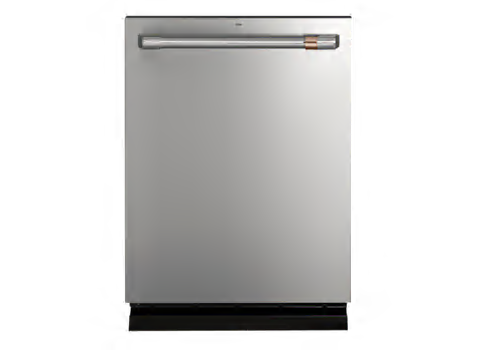
CR’s take: In addition to its stellar energy efficiency, this Café model earned top scores for both washing performance and noise—it is, in fact, among the quietest dishwashers we’ve rated. Café, a GE brand, earns a decent reliability score, too, so even though it costs a little more than some machines, it should have a relatively long life span. In addition to features like a third rack and adjustable racks and tines, this model is equipped with WiFi, which allows you to monitor the dishwasher remotely and can automatically keep tabs on your detergent supply. If you want to save a little money, consider the Café CDT805P2NS1, which costs around $1,200: It’s very similar to this machine, though it lacks some of the wash features (like specific deep-clean silverware jets) and has only one option for its exterior finish (stainless steel).
Samsung DW80R7061UG
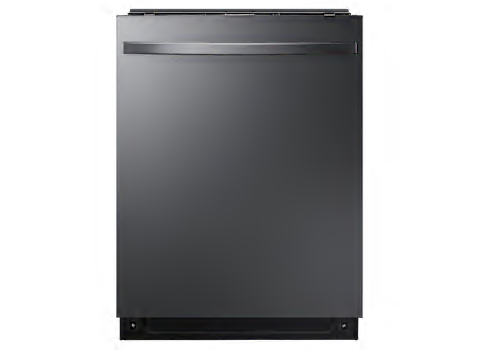
CR’s take: This Samsung dishwasher is a top performer in terms of washing dishes, and it scores well for noise, even if it’s not quite as quiet as the Café above. Its cycle is substantially shorter, though, at 120 minutes, compared with the Café’s 155 minutes. Samsung receives a lower reliability score than that of other brands. But this model still earns our Green Choice designation and shares many of the features of the Café featured above, like a third rack and adjustable racks and tines, for a lower price.
KitchenAid KDPM604KPS
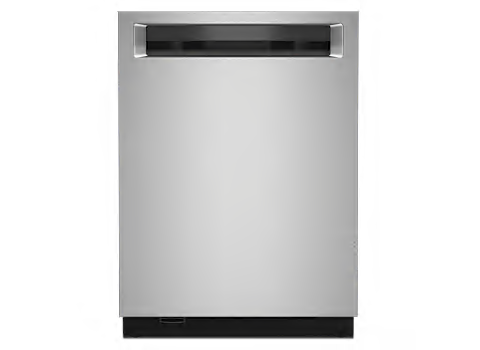
CR’s take: This eco-friendly KitchenAid scores well for washing and exceptionally well for drying, especially for drying plastic items, which is rarer among dishwashers across the board. It’s as quiet as the Samsung, and its reliability matches that of the Café’s—and KitchenAid scores second-highest for owner satisfaction of the brands on this list. It’s a little lighter on interior structural features, but it does have a third rack and a self-cleaning filter.
Bosch SHPM65Z55N
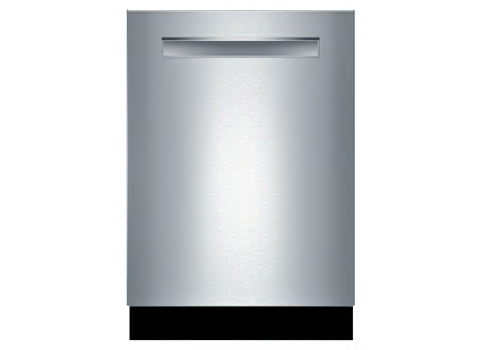
CR’s take: As a brand, Bosch earns the highest possible scores for predicted reliability and owner satisfaction, and its machines routinely top the list of our overall dishwasher ratings. This dishwasher is no exception: It washes very well and dries even better, and it’s as quiet as dishwashers get. One downside is that its cycles can run long at up to 170 minutes. But it includes features like an adjustable third rack, and it sits just above midrange prices for dishwashers.
Whirlpool WDTA50SAKZ
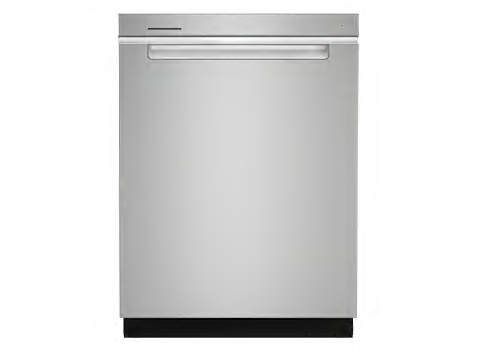
CR’s take: This Whirlpool dishwasher is a solid performer, especially as the least expensive machine on this list. Its washing performance is strong, and Whirlpool as a brand earns a strong score for predicted reliability (it’s almost as good as Bosch’s). It’s relatively quiet and has features including an adjustable upper rack, adjustable tines, and a stainless-steel interior—a feature the rest of the dishwashers on this list share, but which you won’t always find in this price range. There are other very similar Whirlpool models with different interior features, but this one is cheaper and also has more options in terms of exterior finishes.
Consumer Reports is an independent, nonprofit organization that works side by side with consumers to create a fairer, safer, and healthier world. CR does not endorse products or services, and does not accept advertising. Copyright © 2023, Consumer Reports, Inc.
